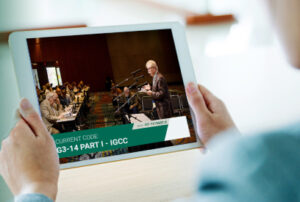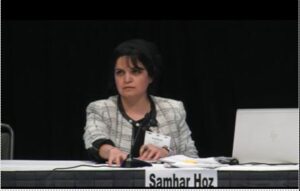
Proposed code changes of interest for the 2022 Committee Action Hearings
Hundreds of building safety professionals from across the U.S. and around the world will gather to learn, network and participate in the Committee Action Hearings
Hundreds of building safety professionals from across the U.S. and around the world will gather to learn, to network and to participate in the Committee Action Hearings to consider proposed changes to the Group B International Codes during the International Code Council’s Committee Action Hearings from March 27 through April 6, 2022, at the Rochester Riverside Convention Center in Rochester, New York. This year’s code hearings offer Code Council members and non-members, code officials, architects, builders, structural engineers, and fire and residential and existing building professionals — as well as those responsible for the administration of the International Codes (I-Codes) — with an opportunity to provide input on proposed code changes to the Group B International Codes.
The International Codes are a family of 15 coordinated, modern building safety codes used throughout the world that protect against disasters like fires, weather-related events and structural failure. The Group B codes that will be considered in Rochester include the structural provisions of the International Building Code (IBC) — Chapters 15–25, the structural and non-structural provisions of the International Existing Building Code, Chapter 1 of the International Green Construction Code (the remainder of the code is based on the provisions of ASHRAE Standard 189.1: Standard for the Design of High-Performance Green Buildings, Except Low-Rise Residential Buildings), the building provisions of the International Residential Code — Chapters 1–10, and Chapter 1 (Administration) of all the International Codes (except the International Energy Conservation Code, International Green Construction Code and International Residential Code) and the update of currently referenced standards in all of the 2021 International Codes (except the International Green Construction Code).
Approximately 775 code change proposals will be considered this year that address a wide range of topics across the Group B codes. The subject matter experts of the Code Council’s Codes and Standards Development division have compiled a shortlist of some of the code change proposals of interest that will be examined during the 2022 Committee Action Hearings.
Code change proposals ADM13-22 (Parts I and II) and ADM14-22
Keith Enstrom, P.E., senior staff engineer in the Codes and Standards Development division in the Code Council’s Central Regional Office, is the staff secretary for the Administrative Provisions of the International Codes changes and the secretary for the International Existing Building Code changes that will be considered during the Group B code cycle.
Code change proposals ADM13-22 (Parts I and II) and ADM14-22 include significant revisions to the existing Section 104 of the International Building Code and similar sections in the other International Codes. Section 104 provides requirements for the duties and powers of the code official. The reason statements for these proposals note that the primary purpose of the proposals is to update the existing Section 104 to reflect the current manner that alternate methods and materials are evaluated, and to differentiate between evaluations from accredited evaluation agencies and evaluations from others, such as engineers. Further, as stated, these provisions have basically been the same since the first edition of the International Codes in 2000, except for the section on Research Reports, which was added in 2003.
Code change proposal S63-22
Lawrence C. Novak, S.E., F.SEI, CERT, LEED AP, chief structural engineer in the Codes and Standards Development division in the Code Council’s Central Regional Office, is the staff secretary for the IBC – Structural changes that will be considered during the Group B code cycle.
Code change proposal S63-22 for the 2024 International Building Code would add, for the first time, tornado loads to Risk Category III and IV buildings and other structures located in tornado-prone regions based on the updated ASCE/SEI 7-22. Tornado hazards have not previously been considered in the design of conventional buildings. The new ASCE/SEI 7-22 tornado hazard maps and load methodology are based on a decade of research and development led by the National Institute of Standards and Technology (NIST), in collaboration with the American Society of Civil Engineers (ASCE). Code change proposal S63-22 was submitted by representatives of ASCE, NIST and the Federal Emergency Management Agency.
Code change proposal EB36-22
Beth Tubbs, P.E., FSFPE, senior staff engineer in the Code Council’s Codes and Standards Development division, is the staff secretary for the International Existing Building Code and ICC Performance Code changes that will be considered during the Group B code cycle.
This proposal seeks to clarify that when a building is essentially demolished, or the intended method of repair is demolition, that construction must comply with the International Building Code (IBC) or International Residential Code (IRC) as new construction. In the case of a portion of a building, the construction must be treated as an addition through either the IBC or IRC. This section would not allow a building to be built back as a repair under the conditions stated and instead would be addressed as new construction. It is also important to note that it requires the foundation to comply with new construction requirements.
Code change proposals RB32-22, RB38-22, RB46-22 through RB71-22
Kimberly Paarlberg, RA, CERT, senior staff architect, and Samhar S. Hoz, LEED Green Assoc., staff engineer in the Codes and Standards Development division in the Code Council’s Central Regional Office, are both staff secretaries for the IRC – Building changes that will be considered during the Group B code cycle.
Code change proposal RB32-22 is a reorganization of Chapter 3 of the International Residential Code (IRC) to improve the usability of the code. Over the years, there have been a number of “adds” to IRC Chapter 3 without a general look at grouping or organization. The biggest stretches are the room area (R304) and height (R305) being multiple sections away from mezzanines (R325) and habitable attics (R326). The intent of this code change proposal is to reorganize the requirements into areas for the following: Structural (proposed R301-307), Fire (proposed R308 -311), Rooms and Spaces (proposed R312-316), Means of Egress (proposed R317-R319), Accessibility/Elevators (proposed R320-R321), MEP (proposed R322-R326), and Energy (proposed R327-R330).
Code change proposal RB38-22 updates the IRC Seismic Design Category (SDC) maps to be consistent with updates to the seismic design maps proposed for the International Building Code (IBC), and those already included in the 2020 NEHRP Recommended Seismic Provisions for New Buildings and Other Structures and ASCE/SEI 7-22. As in past updates, the proposed IRC maps have been developed in collaboration with the U.S. Geological Survey (USGS) and are based on their National Seismic Hazard Models, the site-specific ground motion procedures of the 2020 NEHRP Provisions and ASCE/SEI 7-22 (Chapter 21), and the IRC definition of SDC (Table R301.2.2.1.1). Adoption of these maps will result in a consistent technical basis for the IRC and IBC seismic design maps. Figures in the reason statement, prepared by the USGS, illustrate the locations where the SDC is increasing and decreasing due to this update.
The RB46-22 through RB71-22 group of code change proposals for Sections 302.1 through 3026 are intending to clarify the fire separation requirements for townhouses from each other, common use spaces, attics, attached garages, accessory units and lot lines. There are proposals for where separation is required for interior walls, floors and ceilings; and exterior walls, including parapets. Issues addressed are continuity and the limitations for openings and penetrations.
Important links
2022 Group B Committee Action Hearings Proposed Changes |
Stay connected during the Committee Action Hearings
 The Committee Action Hearings will be conducted in-person only and there will not be any virtual participation. A live webcast will be available online to help stay up to date on proposed changes to the 2021 International Codes for those who cannot attend the hearings in person. It will start at 1:00 p.m. ET on Sunday, March 27, 2022.
The Committee Action Hearings will be conducted in-person only and there will not be any virtual participation. A live webcast will be available online to help stay up to date on proposed changes to the 2021 International Codes for those who cannot attend the hearings in person. It will start at 1:00 p.m. ET on Sunday, March 27, 2022.
In addition to being able to watch the webcast, all the necessary documents are posted on the webpage to help follow the hearings, including proposed code changes, monograph updates, hearing order updates, modification information, real-time results and more.
In accordance with local regulations, masking at the event is optional. The health and safety of attendees are always a top priority, so hand sanitizer and complimentary masks will be available for those who wish to use them. The Code Council will continue to monitor local, state and federal regulations for large gatherings and will adjust its health and safety protocols accordingly.
Save valuable time and stay on schedule by signing up to receive text message updates about the progress of code change hearings during the 2022 Committee Action Hearings. Opt-in to receive text messages. Standard text messaging charges may apply. To unsubscribe, text STOP to 77453. For help, text HELP anytime.
Join the conversation by using #2022codehearings online and through social media.
Learn more about the code development process
The Code Council’s code development process will take two years (2021 Group A and 2022 Group B), resulting in the 2024 editions of the International Codes. To learn the basics of the code development process, check out our video, which is a good primer for those new to the process and explains the Code Council’s cloud-based system for the code development process, cdpACCESS — in terms everyone can understand.
For more information about the code development process, click here. Download infographics about the process: How It Works and By the Numbers.
Advocacy and the code development cycle
The Code Council is the impartial convener of the code development process. Our job is to ensure a transparent process and to provide a space for balanced debate and deliberation on code change proposals. To that end, the Code Council has advocacy guidelines and procedures to guarantee a fair process. We rely on participants in this process to uphold themselves and their colleagues to the highest standards of professionalism and ethical behavior. Read our Code of Ethics.
The Code Council does not provide contact lists to outside organizations; we do not sell or rent our membership list. If you receive unsolicited email referencing code change proposals, please contact Senior Vice President of ICC Technical Services Mike Pfeiffer.











